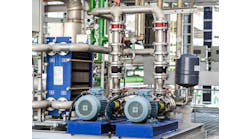One of the latest companies to switch on to the promotional potential of the boom in biofuels is Invensys Process Systems, London, U.K., and Foxboro, Mass. The process automation company recently announced its sponsorship of one of the cars in this years Indy Racing League, whose 2007 IndyCar Series is the first event in which all cars are powered with 100% fuel-grade ethanol.
Joining forces with the Rahal Letterman Racing (RLR) team and Team Ethanol, IPS says its aim is to raise awareness of ethanol and its use as a renewable energy resource. This sponsorship underscores Invensys commitment to the U.S. ethanol industry and our focus on supporting the understanding, acceptance and efficient production of ethanol, says Ken Brown, vice president and general manager of IPS Measurements and Instruments division. That commitment stretches back to the 1950s and, through its Foxboro field instrumentation and controls, the company claims to be the leading supplier of instrumentation for both dry and wet milling ethanol plants, with the largest installed base in the industry.
With Indy cars travelling at speeds of more than 220 mph, you might not spot the IPS logo on No. 17 in this years races, but you cant miss the main branding on the car driven by Indy Racing League rookie-of-the-year contender Jeff Simmons. Its the distinctive e ethanol logo of EPIC, the Ethanol Promotion and Information Council, Omaha, Neb. An alliance of ethanol producers and industry leaders, EPIC is geared to raising awareness about the benefits of ethanol. Racing under the Team Ethanol banner, No. 17 is RLRs entry in the all-ethanol series and is funded by the ethanol design-build firms Fagen, Granite Falls, Minn. and ICM, Colwich, Kan., and the ethanol producer POET Biorefining, formerly known as Broin Companies, Sioux Falls, S.D.
As mentioned in this column last year, when we reported on the success of Audis R10 TDI diesel-powered car in the American Le Mans endurance race, motor sports provide one of the highest-profile platforms possible for companies wanting to promote new technologies. After all, with the notable exception of the week-long triennial Achema in Frankfurt, Germany, there cant be that many process industry events that could draw a crowd of more than 250,000 as turned out for this Mays Indianapolis 500 and that was just for the afternoon of the race. Admittedly, the main interests of people attending an IndyCar event might not be process engineering or the chemical industry, but marketing is all about getting your message out to the widest possible audience, however subliminally.
But theres nothing subliminal about the ethanol message being promulgated around the nations racetracks this year. The Indy Racing League began its conversion to fuel-grade ethanol at the start of the 2006 season by requiring cars to be fueled with a maximum blend of 90% methanol and 10% ethanol. Before then all IndyCar cars had been running on methanol since the 1960s and this years switch to 100% ethanol makes the 2007 Series the first all-ethanol event in motor sports history.
The 17-race season started in March and runs through September, but preparations for the switch to ethanol were well in place before then. The first batch of 100% fuel-grade ethanol was delivered to Indianapolis in January by Renova Energy, the Torrington, Wyo.-based producer contracted by EPIC to supply some 120,000 gals of the fuel to the IndyCar Series. Tom Slunecka, EPICs executive director, expects the fuel switch to have far reaching implications. Ethanol is not only an ideal solution for high performance IndyCar Series cars, he says, but consumers can expect improved performance and environmental benefits as well with ethanol-enriched fuel. From the speedway to Main Street, the partnership between the ethanol industry and the Indy Racing League will deliver stunning results.
While Jeff Simmons in Team Ethanols car No. 17 has been producing steady rather than stunning results on the racetracks finishing 11th in the Indianapolis 500, for example Invensys should be more than pleased to see its sponsorship supporting one of the more imaginative ways of promoting alternative and renewable energy.
